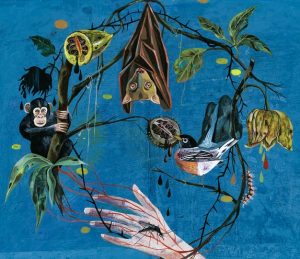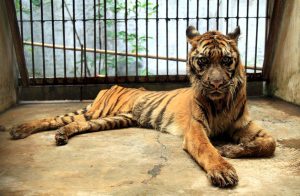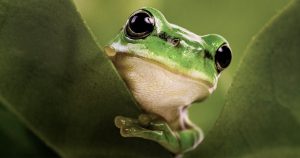“Telling Stories: The Humanities in an Age of Planetary Agenda-Setting”
This Symposium is part of a larger public-facing collaborative initiative between the University of British Columbia (Okanagan campus, Canada) and the University of Exeter (U.K.), which aims to include Arts/Humanities in local and planetary agenda-setting with respect to ongoing climate crises, rather than situating them as contextual “add-ons” to the concerns of the scientific community.

More specifically, the UBC Okanagan iteration of this symposium, which takes place on the Unceded Territory of the Syilx People of the Okanagan Nation, considers what Timothy Morton has called “the net effect”: mass extinction and planetary injustice—exploring the Arts/Humanities as a method in navigating, educating about, and ultimately creating awareness of what it means to live sustainably in an age of mass extinction. As such, our symposium is situated at the interstices of sustainability and multispecies storytelling no longer limited by anthropocentrism.
At a time when demands for change are increasingly urgent, and more planetary agendas are being set, this symposium will explore the significance of storytelling to agenda-setting, both because stories serve to naturalize certain ways of thinking about and acting in the world, and because in a multispecies world, they can invite and inspire meaningful social and cultural engagement and action. To this end, we will also reflect upon interspecies intuitive communication (IIC) as “the exchange of information between humans and other animals (and beings, such as plants) without the need for outward physical cues normally associated with communication (e.g. sound, sight, smell, etc.).” How might such an approach enable us to respond to the more-than-human world? This multispecies field is where our thinking and our discussions begin.
The event is split into two days, registration is required:
Day 1: “Telling Stories: The Humanities in an Age of Planetary Agenda-Setting” Symposium at UBC Okanagan Campus on Wednesday, July 19th, 2023
Day 2: Multispecies Storytelling Workshop at Woodhaven Eco Culture Centre on Friday, July 21st, 2023
View the participant bios HERE.
Zoopolitics of Life and Death
CALL FOR ABSTRACTS 
Critical Animal Studies Graduate Conference
October 17th and 18th 2023 (Deadline: 30 April 2023)
THE NEW INSTITUTE Centre for Environmental Humanities (NICHE) at Ca’ Foscari University of Venice & Institute of Philosophy, Kulturwissenschaften Faculty at Leuphana University, Lüneburg
The concepts of zoopolitics and biopolitics (following Foucault’s theorization) have traditionally been addressed separately, based respectively on a – contested (Derrida) but philosophically pregnant (Agamben) – distinction of zoé and bios. These, as two different Greek terms for “life” in the work of Aristotle (Politics), have been used, in the first case, to merely refer to the lives of nonhuman animals, and the second to a distinctively human form of life. However, we think that these terms need to be articulated together to address the multispecies composition of contemporary natureculture assemblages and their lively capital (Haraway; Helmreich).
The always situated lines running through humanity and animality, the animate and the inanimate (Chen), the organic and the machinic (Haraway), what is deemed worth living, saving, preserving and what is expendable and killable, are, at once, dividing and implicating: it is around such ideological and material boundaries that the logic and apparatuses of exploitation, extractivism, marginalization, domination are structured and sustained. Today, biopolitics (Foucault), techno-biopolitics (Haraway), zoopolitics (Agamben, Derrida), molecular biopolitics (N. Rose) necropolitics (Mbembe) show how animal life and death are increasingly defined and managed in order to be capitalized, starting from the very appearance of life itself.
Thus, in a Critical Animal Studies perspective, addressing the biopolitics of human-nonhuman relations and the divides between them we cannot ignore the nonhuman “counterpart”, which means addressing zoopolitics, and the contiguity of the two (Shukin; Wadiwel; Piazzesi). After all, life always acknowledges, creates and sustains relationality, as Feminist Animal Studies underline, from Ecofeminism (Adams, Gaard, Gruen, Donovan) to new materialist and compostist approaches (Alaimo, Barad, Haraway). Following the principles of Critical Animal Studies, we thus adopt a holistic approach to confront oppressions (Fitzgerald and Pellow), shared exploitation and vulnerability, but also to put liveability and flourishing according to a total liberation framework to the forefront (Best, White, Nocella II).
In this spirit, the conference welcomes both theoretical and empirically-oriented papers on topics critically addressing the politics of life and death of nonhuman animals from the fields of the Humanities and the Social Sciences, including but not limited to the following themes and areas:
- The zoopolitical turn
- The Ag-Tech industry complex
- Nonhuman animals within capitalist societies
- Multispecies reproductive justice
- Productive and reproductive labour
- Social justice movements and Critical Animal Studies
- Ableism, racism, and speciesism: selection, taxonomies, categorization, eugenics
- Power/knowledge of and over bodies
- Queering normativity, resisting identification
- Disposable lives, killable bodies, hunting, pests, animal genocide
- Forms of “rendering”
- The display of animals: the zoopticon, trophies, performance, the arts, taxidermy, zoos, circuses
- Prisons, cages and other forms of animal life erasure
- Space, borders, walls: containment and mobility
- Health, risk, vulnerability
- Toxicity and endangered lives
- Ecocide, extractivism, extinction
- Veganism as life politics
- Buddhism and veganism, Critical animal studies in Asia
- Politics of mourning, memory and witnessing
- Practices of care
- Liberation, resistance, desire, empowerment
- Biodiversity, restoration, maintenance, flourishing
- Indigenous and Non-Western worldviews and multispecies practices
- Histories, genealogies and futures of multispecies politics and communities
The conference will be held in English, presentations will have a 15-20 minute length, depending on the schedule. To participate as presenters, please use this google form to provide:
- An abstract text: 350 and 450 words + 3 references + 5 keywords
- A brief biography of the author (150 words maximum) including name, affiliation and contact details
- Start of Abstract Submission: 15 March 2023,
- Deadline for abstract submission: 30 April 2023
- Notification of acceptance: 31 May 2023
Registration for presenters and attending students needing certification is mandatory (it will be possible to register after abstract selection ends). Presenting participants and attending students needing certification are kindly asked to attend in presence. Papers will be selected for publication after the conference closure. Please note that the conference has no registration fee, and will take place in presence and online in Venice and in Lüneburg at the same time. For any inquiry and additional information, please write to Chiara Stefanoni (Leuphana University) and Federica Timeto (Ca’ Foscari University) at: zoopolitics.conference@gmail.com

UBC Okanagan & Exeter University (UK) Seminar Series: Wicked Problems and the Humanities: Literature, Film and the Anthropocene
Starting in 2023, researchers from the University of British Columbia Okanagan will be travelling to Exeter University (UK) for a series of seminars, talks and artist presentations.
Funded by a UBC Okanagan-Exeter Excellence Catalyst Grant, at a time when demands for change are increasingly urgent, and more and more planetary agendas are being set, this project explores how humanities scholars at UBC and Exeter can engage critically with the opportunities and challenges these agendas pose for our disciplinary expertise, methodologies and perspectives. We investigate the significance of story-telling to agenda-setting, both because stories serve to naturalize certain ways of thinking about and acting in the world, and because they can invite and inspire meaningful social and cultural engagement and action.
 May 8-12th, 2023 with online access beginning April 8th
May 8-12th, 2023 with online access beginning April 8th
Have you ever wondered what an animal or other more-than-human being was trying to tell you?
The Multispecies Methods Research Symposium is a unique event that brings together scholars, artists, Indigenous Knowledge Keepers, animal care providers, and animal communicators to share knowledge, ideas, and build a multi-sectoral (and multispecies) research community. Focusing on intuitive interspecies communication (IIC), our purpose is to share knowledge and build collaborations to support research that enhances our collective goal: to listen to the voices of animals and nature1 for the wellbeing of all.
Following on the success of last year’s symposium, we invite you to join us for a 5-day interactive online event which includes many opportunities to network and learn on our enhanced online platform both before and after live events. As this practice is a relatively new area of dedicated academic study, symposium organizers want attendees to know that this forum will neither prove nor disprove that interspecies communication is occurring. Rather, this is an opportunity for interested individuals, practitioners and academics to engage in thoughtful and productive dialogue about IIC.
Acknowledging the limitations of language and that humans are also animals and part of nature, we use the term ‘animal’ to refer to animals who are not human and ‘nature’ to represent all the many other-than-human beings with whom we are in relation.
WHO IS THIS FOR? This event will be of interest to those who are seeking to more deeply understand intuitive interspecies communication, including researchers, animal care practitioners and caretakers, animal and interspecies communicators, conservation practitioners, artists and educators. As we prepare this event, we acknowledge that the University of Saskatchewan is on Treaty 6 Territory and the Homeland of the Métis. We also acknowledge the many plants, animals, ancestors and other beings who are supporting this event, and pay our respect to the First Nations and Métis ancestors.
AIMS:
- Scholarly exploration and deeper understanding of intuitive interspecies communication (IIC);
- Catalyze novel partnerships and grow an international network of IIC research;
- Develop new research questions, directions, teams, and discussion groups across diverse areas of inquiry and disciplines.
PROGRAM HIGHLIGHTS:
- Keynotes by researchers, thought leaders and practitioners, including Anna Breytenbach and Chara Armon
- Panel presentations on highly relevant topics of interest
- Sample interspecies consultation with a professional animal communicator
- Contributions from Indigenous Knowledge Keepers
- Small group dialogues based on participant interest (e.g. ethics; wildlife, working with veterinarians, animal shelters; intercultural implications; design, etc.)
- Enhanced networking opportunities with scholars, interspecies communicators, and other attendees
- Pre-and post-event viewing on an online platform with enhanced networking features, beginning April 8th
We will continue to update this page as details about the 2023 Symposium are finalized.